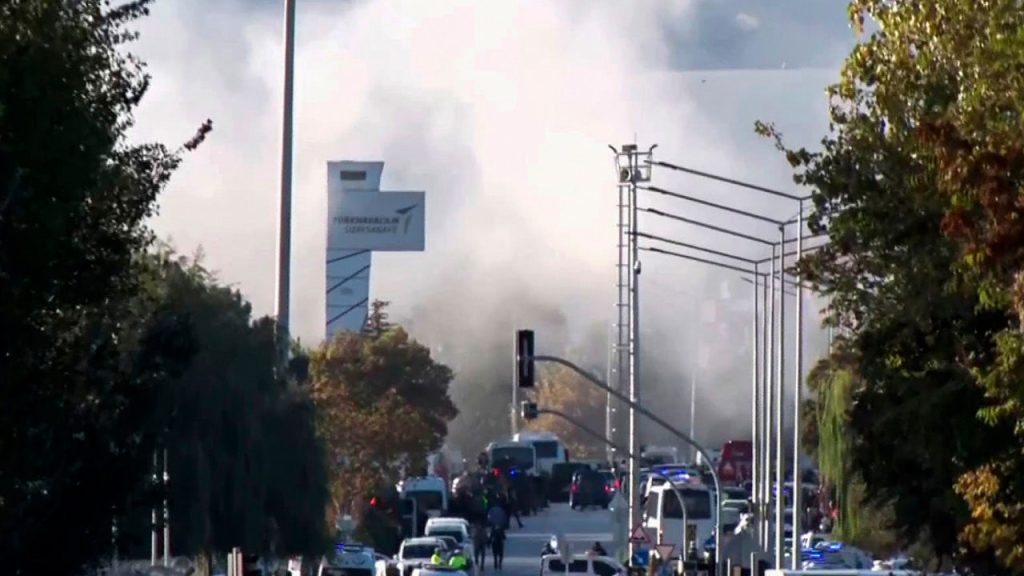Turkey, a member of NATO, conducted a second day of airstrikes on Kurdish militant positions in Iraq and Syria following a terrorist attack on a state-run defense agency that resulted in five deaths. The attacks targeted locations used by the Kurdistan Workers’ Party (PKK) and Syrian Kurdish militia affiliated with the group. Kurdish forces have accused Turkey of indiscriminate bombing that has targeted civilian areas and health centers, resulting in casualties including two children. The Syrian Democratic Forces (SDF), long-standing allies of the U.S. in the fight against ISIS, have condemned the attacks as war crimes.
Turkish Defense Minister Yasar Guler reported that 47 PKK targets were destroyed in the airstrikes, with 29 in Iraq and 18 in Syria. The strikes were launched in response to an attack on an aerospace and defense company in Ankara, in which two suspects killed five people before being neutralized by security forces. The PKK has not claimed credit for the attack. The United States Embassy in Turkey condemned the incident as a “terrorist attack,” while the Turkish Embassy in Washington, D.C., did not immediately respond to requests for comment. The aerial bombardment in Iraq and Syria has resulted in civilian casualties, including children, according to the SDF.
The SDF reported 12 deaths in the Turkish airstrikes, including two children, and 25 injuries on Thursday. The attacks targeted not only civilian areas but also essential facilities such as bakeries, power stations, and oil facilities. The mountainous region bombed by Turkey had already been depopulated due to previous military operations in the area. Kurdish forces have expressed readiness for dialogue but remain prepared to defend their people and land. The U.S. State Department has not commented on the attacks and civilian casualties reported by the SDF, who have been important partners in the fight against ISIS.
Armed drones were used by Turkey to hit military, intelligence, energy, and infrastructure facilities, as well as ammunition depots. The aerial assaults began after two Kurdish assailants carried out the attack on the defense agency in Ankara. The suspects arrived at the TUSAS premises armed with assault rifles, stole a taxi, set off explosives, and opened fire, resulting in casualties. The Turkish Defense Minister assured the nation of continued efforts to eliminate threats to security and peace in the region until all terrorists are eliminated. The PKK, which has been designated as a terrorist organization by the U.S., has not claimed responsibility for the attack.
The SDF statement highlighted that Turkish warplanes and UAVs targeted civilian, service, and health centers, terming the actions as war crimes. In addition to the airstrikes, Turkish artillery shelling hit essential civic facilities, resulting in civilian casualties. The SDF has called for an end to the indiscriminate bombing and emphasized their willingness to engage in dialogue while preparing to defend their people and land. Turkey’s actions have raised concerns about escalating tensions and the impact on civilians in the region. The conflict between Turkey and Kurdish forces has long been a source of instability, with various groups vying for control and influence in the area.
The situation in Iraq and Syria remains volatile, with ongoing airstrikes and military operations by Turkey targeting Kurdish militants. The attacks have resulted in casualties among civilians and Kurdish forces, raising concerns about the humanitarian impact of the conflict. The SDF’s condemnation of the Turkish airstrikes as war crimes highlights the gravity of the situation and the need for a diplomatic resolution to the conflict. As tensions escalate, there is a growing concern about the potential for further violence and instability in the region. The international community, including the U.S. and NATO, will need to address the root causes of the conflict and work towards a peaceful resolution to ensure the safety and well-being of all those affected by the ongoing violence.


